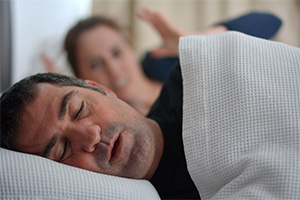
Exercising regularly is one of the most important parts of keeping your body healthy and strong. Working out helps you maintain your weight, boost your endurance, improve your mood, and more. Even so, about half of Americans exercise regularly. While working out benefits your overall well-being, it has also been shown to help with symptoms of sleep apnea. Continue reading to learn about the link between sleep apnea and exercising.
What Is Sleep Apnea?
Obstructive sleep apnea is the most common sleep disorder related to breathing. With this condition, the tongue or soft tissues in the back of the mouth create an obstruction that causes frequent breathing disruptions while asleep. Though anyone can develop sleep apnea, people with a large neck circumference and those who are obese have an increased risk.
Common symptoms of sleep apnea include loud snoring, irritability, insomnia, morning headaches, disturbed sleep mood changes, breathing pauses while sleeping, and more. You may also have an increased risk of developing cardiovascular disease and other health issues if you don’t seek out treatment.
How Exercising Affects Sleep Apnea
A study performed by the University of Pittsburgh’s School of Dental Medicine found that regular exercise can lower daytime sleepiness. This may boost thinking clarity as well as mental alertness. This study also found that a brisk walk or weight training can reduce symptoms of sleep apnea by up to 25%, even without losing weight.
Consider adding a 30 to 40-minute walk to your routine at least four times per week. Not only will this help you sleep better, but it may also combat some of the additional health concerns associated with sleep apnea, such as an increased risk of heart attack, cardiovascular disease, or stroke.
Managing Your Sleep Apnea
Outside of exercise, there are several other ways that you can manage sleep apnea, such as:
- Use a CPAP – This stands for continuous positive airway pressure and is a traditional method of treating sleep apnea. This machine delivers gentle air pressure greater than atmospheric pressure through a mask worn over the nose or mouth. It pushes against blockages to open your airways so your lungs receive enough oxygen.
- Wear an oral appliance – This is an alternative to using a CPAP machine that will keep your airway open and clear of blockages.
- Try to lose weight – If you exercise and drop a few pounds, this can further alleviate symptoms of sleep apnea and will also boost your general quality of sleep.
About the Practice
Sleep Better Baytown offers patients in Baytown as well as the surrounding communities a range of treatments to help them care for their smiles. If you struggle with sleep apnea, they can get to the bottom of the issue and determine what the best option is to help you get the rest you need problem-free. If you are interested in setting up an appointment with Sleep Better Baytown or want to learn more about how to manage sleep apnea, call their office at (281) 422-8249 or visit their website.
